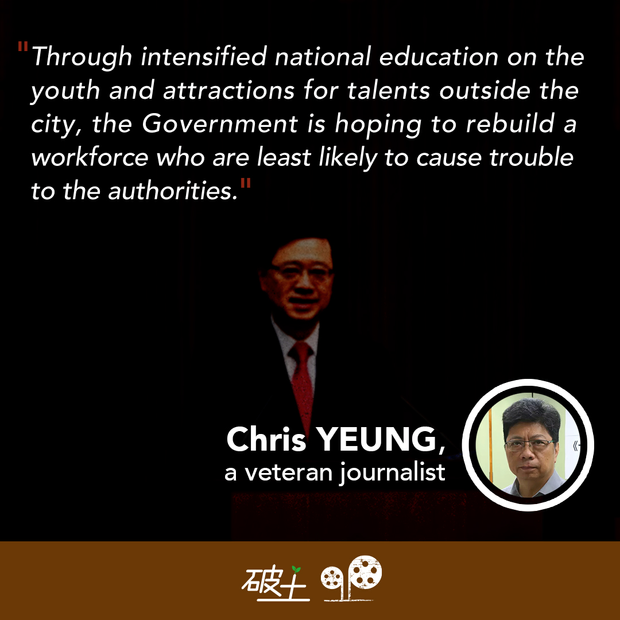John Lee fails to make new start

Any policy blueprint mapped out by a government aiming to start a new chapter for their city without facing up to their failures and shortcomings in the previous chapter is incomplete, to put it mildly. With the future of Hong Kong dimmed by turbulence caused by the 2019 unrest and its aftereffects, the effectiveness of government calls for the populace to look forward is in doubt.
The 2022 Policy Address delivered by Hong Kong’s Chief Executive John Lee on October 19 is an example. An opportunity to heal old wounds to make a fresh start is lost.
Handpicked by the Beijing leadership to displace the beleaguered Carrie Lam to take up the post of chief executive early this year, Lee should know better than anyone, except Lam perhaps, in the last administration about what went wrong in her five-year term.
A bill on extradition he held responsible in his capacity as Secretary for Security had whipped up a storm of protests beginning from May 2019. It was then morphed into a citywide social movement marred by violent confrontation between protesters and the Police.
To end chaos and restore order, China’s national legislature enacted a law on national security, which took effect on July 1, 2020. Under the Basic Law Article 23, Hong Kong shall enact a law to prohibit acts of subversion, secession and others that endanger national security.
Giving the power to legislate on the highly-sensitive issue to Hong Kong by the then Beijing leaders was prompted by a sense of pragmatism to ease concerns about human rights protection when a law on national security is in place.
Departing from Article 23, the legislative act of the National People’s Congress has sent jitters to the city and the international community. Worse, the scope, content and letter of the law have stoked more fears due to their broadness and vagueness.
The national security law has proved to be no paper tiger. A string of cases relating to the law, including the case involving Apple Daily founder Jimmy Lai and several senior editors, emerged since mid-2020 has rocked confidence in press freedom and freedom of expression among journalists and in society.
It did not take long for the city to be hit by a fresh wave of migration following the implementation of the law and the unfolding of events one after another that have eroded confidence. They include the disbandment of civil society groups such as unions and intensified national education in schools.
Deepening the feeling of anxiety, the government’s tight anti-Covid measures since the outbreak of the pandemic in 2020 have brought about practical difficulties to families who have young children studying abroad and business people who need to travel frequently.
Strict hotel quarantine and medical surveillance requirements for inbound travelers have caused serious disruption to work and visits of families who have members abroad.
Also importantly, the SAR Government’s tight anti-Covid strategy has given more credence to the theory that the John Lee administration, like his predecessor Carrie Lam, has to follow the mainland’s “zero-infection” strategy. The high degree of autonomy Hong Kong is entitled to under the Basic Law has become a hollow promise when it comes to battling against the pandemic.
Like the wave of mass exodus of Hongkongers beginning from the mid-1980s and worsened after the 1989 Tiananmen Square crackdown, the latest wave of migration is caused by a confidence crisis in the one country, two system policy and the central and Hong Kong governments.
Admittedly, public expectation of a frank admission of a confidence crisis by John Lee in his maiden policy address has been low. Nor were there hopes for him taking a step forward, albeit a tiny one, to heal the wounds inflicted during the 2019 unrest. But a more down-to-earth admission of the problem of brain drain and a show of intent in tackling the problem are the least he can do – and should do.
Not surprisingly, the 2019 confrontation is barely touched upon in his lengthy speech. Lee revealed the local workforce shrank by 140,000 over the past two years. He gave no explanation of the shrinking workforce, but was long in his plan to “trawl the world for talents.”
Instead of stopping the outflow of the locally-born young and bright, Lee is setting his eyes on talents elsewhere and is prepared to offer various kinds of incentives to lure them to make Hong Kong their home.
Lee’s cool attitude to those who have left and others are planning to do so contrasts oddly to his warm embrace of talents from other parts of the world, whom he may think are more likely to be more accommodating to the new rules and norms in the new era.
A Chinese University academic Lau Siu-kai, who is vice president of the Chinese Association of Hong Kong and Macau Studies, has earlier said it might not be a bad thing for Hong Kong for those who hold dissenting views to have fled the city.
Lau’s observation has explained why the Government has reacted cooly to calls for them to address concerns about human rights and education issues to help lure Hong Kong migrants back.
Through intensified national education on the youth and attractions for talents outside the city, the Government is hoping to rebuild a workforce who are least likely to cause trouble to the authorities.
It may be mere wishful thinking if damages to confidence in the city inflicted since the 2019 social movement have not been repaired – and with more salt being put on the wounds. More young people may leave, with few dare to come and stay in the new Hong Kong.
▌[At Large] About the Author
Chris Yeung is a veteran journalist, a founder and chief writer of the now-disbanded CitizenNews; he now runs a daily news commentary channel on Youtube. He had formerly worked with the South China Morning Post and the Hong Kong Economic Journal.